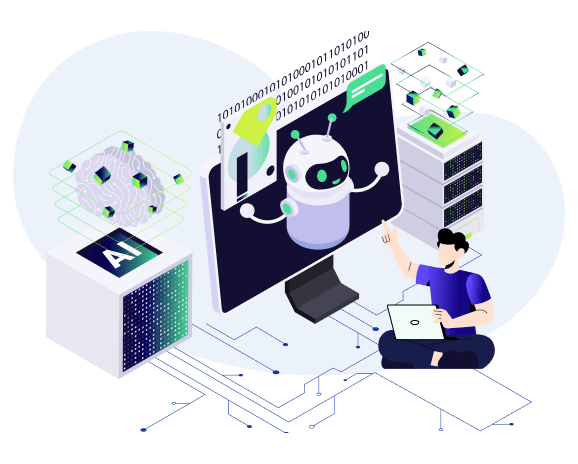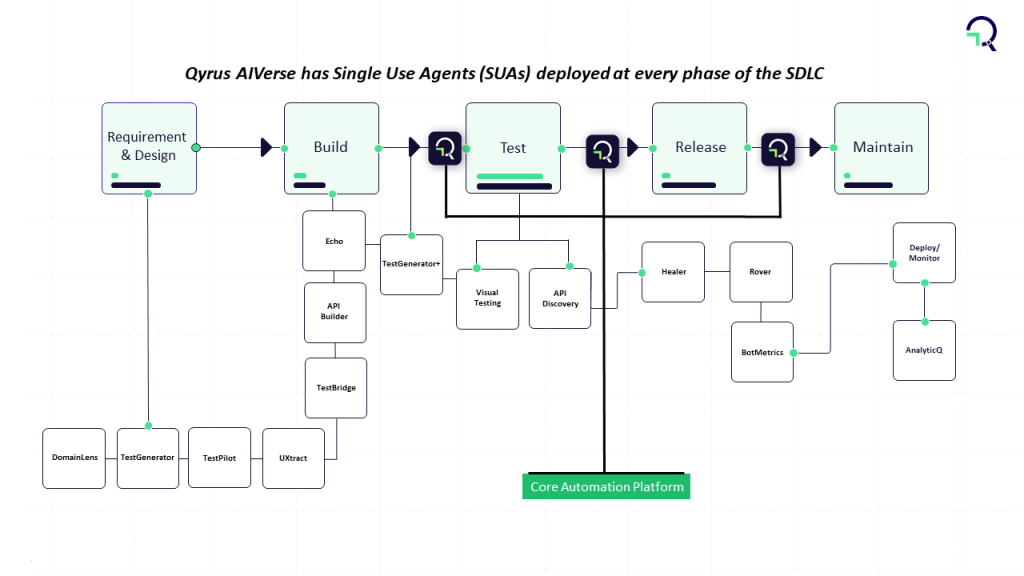Beyond Automation: The Rise of Intelligent Testing with AI and ML

The software industry is going through a transformation of Artificial Intelligence (AI) and Machine Learning (ML). Software Testing is no exception to this. Advanced technologies like AI and ML are revolutionizing the traditional software process and practices. AI and ML help reduce the complexities involved in Software Testing. The new AI capabilities focus on speed, accuracy, and delivery. Though shift-left testing has been a buzzword in the software industry for a long time, it was hard to achieve due to many challenges, and AI and ML solutions quickly made it possible. This revolution not only helps the organization but also helps testers focus on their core objective of delivering high-quality software in reduced time to market.
As per Fortune Business Insights, the AI-enabled market is projected to grow up to USD 2,746.6 million by 2030, exhibiting a CAGR of 20.7% during the forecast period. By 2025, nearly 70% of freshly developed enterprise solutions will be created with the help of low-code or no-code technologies.

What is AI and ML
Artificial Intelligence, or AI, refers to the simulation of human intelligence in machines that are designed, developed, and programmed to think as humans and mimic human actions. ML is the branch of AI that refers to the development of algorithms, using data by helping the AI to imitate the way that humans learn, gradually improving its accuracy. The difference between AI and ML is that AI is an end product that mimics one or more tasks. ML is a subset that helps to build AI-based systems by focusing on algorithms.
What’s the difference between AI and ML?
ML is the subsystem of AI; However, AI can exist with or without ML. Most of the AI systems use ML for prediction and self-correction. ML can also help with accuracy. The detailed comparison of AI and ML is as follows.
| Artificial Intelligence (AI) | Machine Learning (ML) |
| AI allows to simulate the human intelligence | ML learn autonomously from historical data |
| AI helps to build the intelligent system to perform complex tasks | ML helps to build the machine with high accuracy by learning its own over the period |
| AI has a broad range of applications | ML scope is limited compared to AI |
| AI can mimic human decision-making. | ML uses the self-learning technique; it can help in producing predictive models. |
| AI can use structured, semi-structured, and unstructured | ML uses only structured and semi-structured data |
| AI utilizes the decision trees to learn, reason, and correct itself | ML uses statistical models to learn, but it can self-correct with new data |
How does AI help to reshape test automation?
Organizations are adopting the Agile methodology to go early to the market. Though application development easily adjusts to the rapid change, software testing still faces challenges when adopting Agile. Most of the time, the deliverables come towards the end of the sprint with tight timelines. Following all the testing processes and completing test activities within the same sprint is not only difficult but also challenging.
Testing activities involve analyzing the requirements, creating the test cases with expected and actual results, labeling them with the right priority, and automating them. These tasks seem very simple but take a lot of time and effort. The testing tools are evolving with AI capabilities, they can generate the test cases based on the requirement, and with additional configuration, they can also generate the test automation script. This considerably reduces the effort and saves a lot of time.
Today, many test automation tools come with in-built AI capabilities. Some of the latest trends in AI and ML (test automation tools) are no-code-based tools, intelligent recording of test scripts, and intelligent conversion of natural language to programming language. AI and ML solutions are not only helpful in test automation; they also generate the load on a system based on historical data and help in performance testing. It can analyze the application code and suggest possible vulnerabilities, security breaches, etc.
Benefits of AI-based test automation tool
- It reduces the complexity involved in the testing process
- It intelligently suggests a possible fix by making a test failure analysis
- AI can reduce the technical proficiency required in automation with no-code and natural language processing
- AI reduces the maintenance effort
- It can identify the gaps in test automation and help in increasing the test coverage.
- It can save the organization’s costs in various ways, such as by reducing technical resources, automating repetitive tasks, etc.
- AI can help in test automation efficiency and reliability by decreasing flakiness and maintenance.
How AI-based testing tool helps to accelerate test automation
There are many AI-based tools in the market, each offers many unique features. Most of the tools focus on the no-code-based feature. Qyrus is focused on bringing the most out of AI capabilities in terms of automation testing and testing processes. The Qyrus AI Verse provides all the basic AI features, such as no-code or scriptless automation. It provides AI-based testing solutions for Mobile and Web platforms with capabilities of UI, Component, and API testing. Some of the notable features of Qyrus are that it allows the AI and ML solutions for visual testing with Rover. Users utilize TestGenerator to generate functional test cases by automatically reading the JIRA tickets. As mentioned earlier, the in-sprint automation and shift left testing can be easily done by integrating TestGenerator into Qyrus. It translates acceptance criteria into functional test cases, which can be easily converted to automation scenarios with Qyrus no-code automation testing. It can also facilitate shift left and continuous monitoring using GenAI technology.

Conclusion
Software testing is undergoing a major revolution with modern AI and ML technologies. AI and ML can reduce the complexities involved in the testing process by mimicking human actions. Repetitive tasks no longer require human interference. Though many tools attempt to bring AI into automation testing not all are successful. Qyrus is focusing on bridging all the gaps in software testing and automation with AI and ML capabilities. Additionally, Qyrus provides the features to integrate many popular AI tools like TestGenerator, API Discovery, TestPilot, Rover, etc. to get the most out of AI. The AI technology in the Qyrus tool can significantly reduce the organization’s cost and help increase the ROI.





